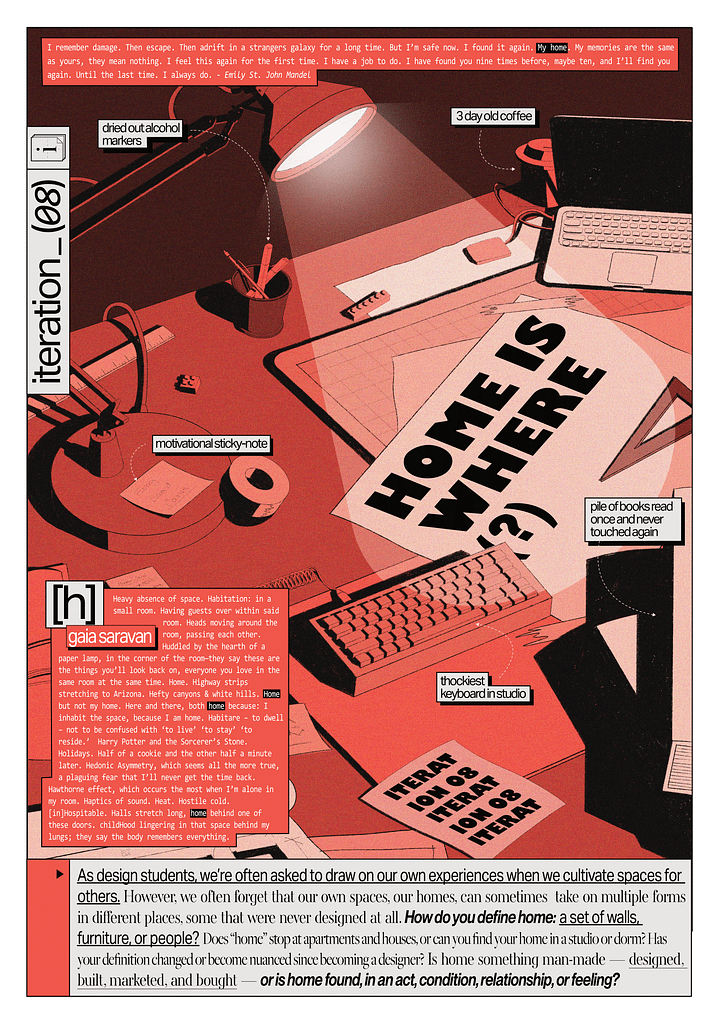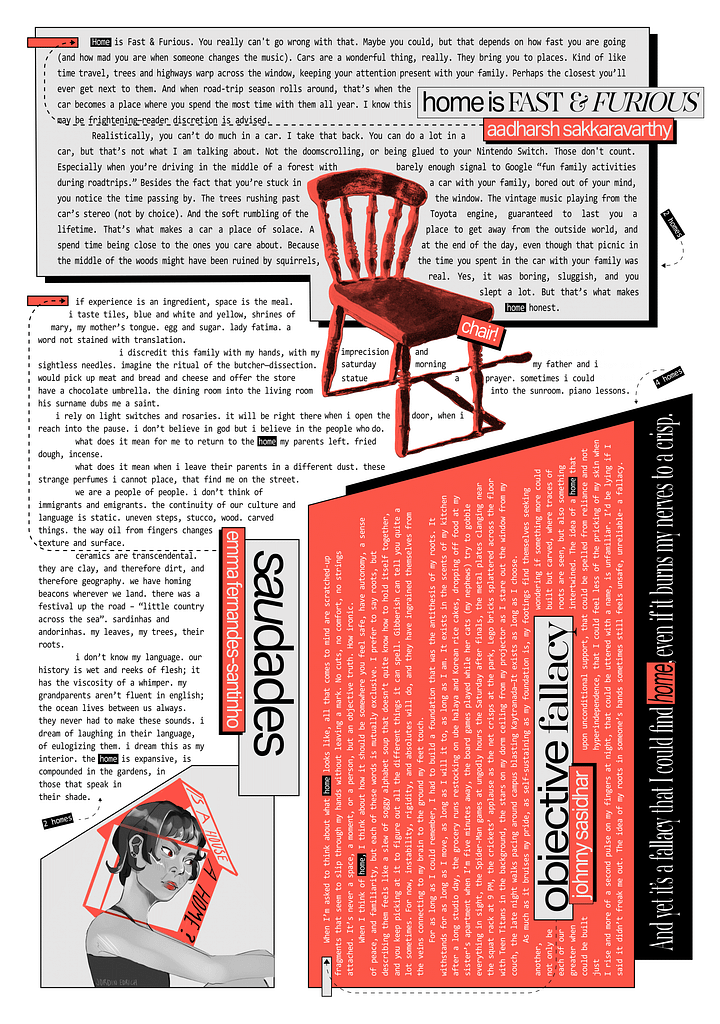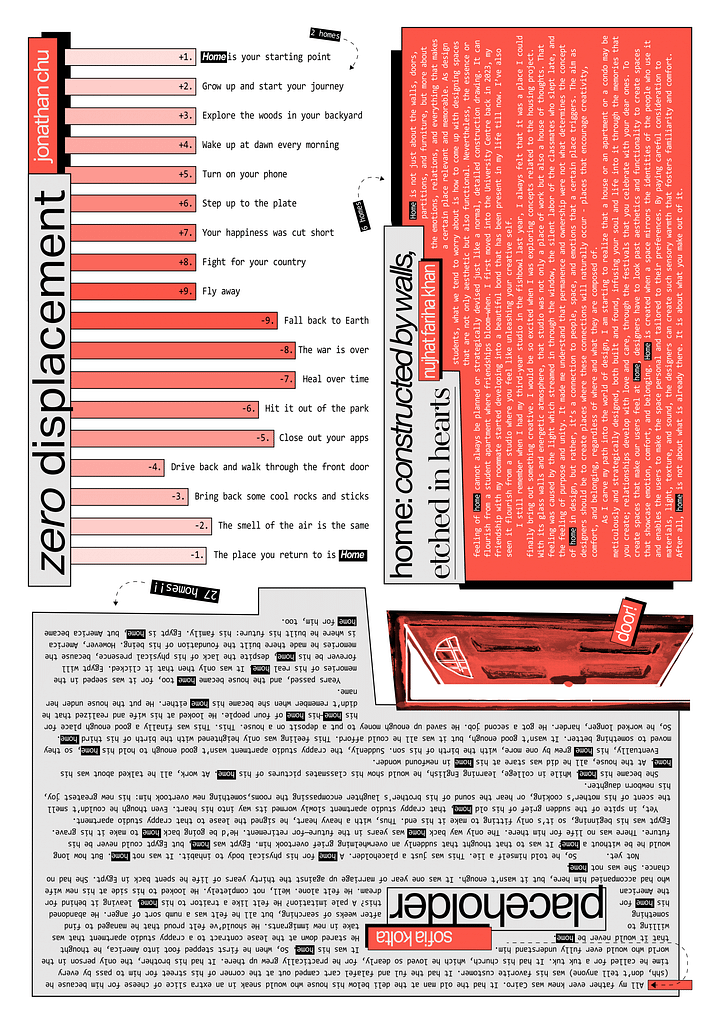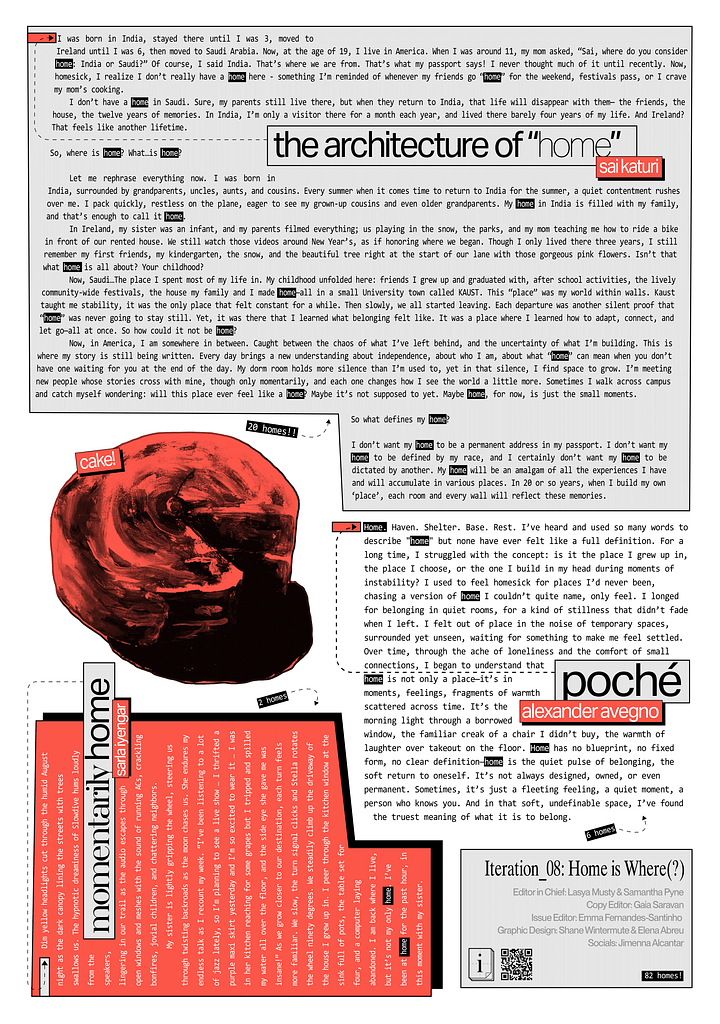Iteration_08: "Home is Where(?)"
... Where the heart is.
As design students, we’re often asked to draw on our own experiences when we cultivate spaces for others. However, we often forget that our own spaces, our homes, can sometimes take on multiple forms in different places, some that were never designed at all. How do you define home: a set of walls, furniture, or people? Does “home” stop at apartments and houses, or can you find your home in a studio or dorm? Has your definition changed or become nuanced since becoming a designer? Is home something man-made — designed, built, marketed, and bought — or is home found, in an act, condition, relationship, or feeling?




Editors-in-Chief: Lasya Musty & Samantha Pyne
Copy Editor: Gaia Saravan
Issue Editor: Emma Fernandes-Santinho
Graphics Team: Shane Wintermute & Elena Abreu
Socials: Jimenna Alcantar
Poché
Alexander Avegno
Home. Haven. Shelter. Base. Rest. I’ve heard and used so many words to describe “home” but none have ever felt like a full definition. For a long time, I struggled with the concept: is it the place I grew up in, the place I choose, or the one I build in my head during moments of instability? I used to feel homesick for places I’d never been, chasing a version of home I couldn’t quite name, only feel. I longed for belonging in quiet rooms, for a kind of stillness that didn’t fade when I left. I felt out of place in the noise of temporary spaces, surrounded yet unseen, waiting for something to make me feel settled. Over time, through the ache of loneliness and the comfort of small connections, I began to understand that home is not only a place—it’s in moments, feelings, fragments of warmth scattered across time. It’s the morning light through a borrowed window, the familiar creak of a chair I didn’t buy, the warmth of laughter over takeout on the floor. Home has no blueprint, no fixed form, no clear definition—home is the quiet pulse of belonging, the soft return to oneself. It’s not always designed, owned, or even permanent. Sometimes, it’s just a fleeting feeling, a quiet moment, a person who knows you. And in that soft, undefinable space, I’ve found the truest meaning of what it is to belong.
Zero Displacement
Jonathan Chu
+1. Home is your starting point
+2. Grow up and start your journey
+3. Explore the woods in your backyard
+4. Wake up at dawn every morning
+5. Turn on your phone
+6. Step up to the plate
+7. Your happiness was cut short
+8. Fight for your country
+9. Fly away
-9. Fall back to Earth
-8. The war is over
-7. Heal over time
-6. Hit it out of the park
-5. Close out your apps
-4. Drive back and walk through the front door
-3. Bring back some cool rocks and sticks
-2. The smell of the air is the same
-1. The place you return to is home.
Constructed by Walls, Etched in Hearts
Nujhat Fariha Khan
Home is not just about the walls, doors, partitions, and furniture, but more about the emotions, relations, and everything that makes a certain place relevant and memorable. As design students, what we tend to worry about is how to come up with designing spaces that are not only aesthetic but also functional. Nevertheless, the essence or feeling of home cannot always be planned or strategically devised just like a normal, detailed construction drawing. It can flourish from a student apartment where friendships bloom—when I first moved into the University Centre back in 2023, my friendship with my roommate started developing into a beautiful bond that has been present in my life till now. I’ve also seen it flourish from a studio where you feel like unleashing your creative self.
I still remember when I had my third-year studio in the fishbowl last year, I always felt that it was a place I could finally bring out something creative. I would be so excited when I was exploring concepts related to the housing project. With its glass walls and energetic atmosphere, that studio was not only a place of work but also a house of thoughts. That feeling was caused by the light which streamed in through the window, the silent labor of the classmates who slept late, and the feeling of purpose and unity. It made me understand that permanence and ownership were not what determines the concept of home in design, but rather, it’s a connection to people, space, and emotions that a certain place triggers. The aim as designers should be to create places where these connections will naturally occur - places that encourage creativity, comfort, and belonging, regardless of where and what they are composed of.
As I carve my path into the world of design, I am starting to realize that a house or an apartment or a condo may be meticulously and strategically designed, both built and found, infusing your soul and life into it through the memories that you create; relationships develop with love and care, through the festivals that you celebrate with your dear ones. To create spaces that make our users feel at home, designers have to look past aesthetics and functionality to create spaces that showcase emotion, comfort, and belonging. Home is created when a space mirrors the identities of the people who use it and enables the users to make the space personal and tailored to their preferences. By paying careful consideration to materials, light, texture, and sound, the designers can create such sensory warmth that fosters familiarity and comfort. After all, home is not about what is already there. It is about what you make out of it.
saudades
Emma Fernandes-Santinho
if experience is an ingredient, space is the meal. i taste tiles, blue and white and yellow, shrines of mary, my mother’s tongue. egg and sugar. lady fatima. a word not stained with translation.
i discredit this family with my hands, with my imprecision and sightless needles. imagine the ritual of the butcher—dissection. saturday mornings my father and i would pick up meat and bread and cheese and offer the store statue a prayer. sometimes i could have a chocolate umbrella. the dining room into the living room into the sunroom. piano lessons. his surname dubs me a saint.
i rely on light switches and rosaries. it will be right there when i open the door, when i reach into the pause. i don’t believe in god but i believe in the people who do.
what does it mean for me to return to the home my parents left. fried dough, incense.
what does it mean when i leave their parents in a different dust. these strange perfumes i cannot place, that find me on the street.
we are a people of people. i don’t think of immigrants and emigrants. the continuity of our culture and language is static. uneven steps, stucco, wood. carved things. the way oil from fingers changes texture and surface.
ceramics are transcendental. they are clay, and therefore dirt, and therefore geography. we have homing beacons wherever we land. there was a festival up the road – “little country across the sea”. sardinhas and andorinhas. my leaves, my trees, their roots.
i don’t know my language. our history is wet and reeks of flesh; it has the viscosity of a whimper. my grandparents aren’t fluent in english; the ocean lives between us always. they never had to make these sounds. i dream of laughing in their language, of eulogizing them. i dream this as my interior. the home is expansive, is compounded in the gardens, in those that speak in their shade.
Momentarily Home
Sarla Iyengar
Dim yellow headlights cut through the humid August night as the dark canopy lining the streets with trees swallows us. The hypnotic dreaminess of Slowdive hums loudly from the speakers, lingering in our trail as the audio escapes through open windows and meshes with the sound of running ACs, crackling bonfires, jovial children, and chattering neighbors.
My sister is lightly gripping the wheel, steering us through twisting backroads as the moon chases us. She endures my endless talk as I recount my week. “I’ve been listening to a lot of jazz lately, so I’m planning to see a live show … I thrifted a purple maxi skirt yesterday and I’m so excited to wear it … I was in her kitchen reaching for some grapes but I tripped and spilled my water all over the floor, and the side eye she gave me was insane!” As we grow closer to our destination, each turn feels more familiar. We slow, the turn signal clicks and Stella rotates the wheel ninety degrees. We steadily climb up the driveway of the house I grew up in. I peer through the kitchen window at the sink full of pots, the table set for four, and a computer laying abandoned. I am back where I live, but it’s not my only home. I’ve been at home for the past hour, in this moment with my sister.
The Architecture of “Home”
Sai Katuri
I was born in India, stayed there until I was three, moved to Ireland until I was six, then moved to Saudi Arabia. Now, at the age of 19, I live in America. When I was around 11, my mom asked, “Sai, where do you consider home: India or Saudi?” Of course, I said India. That’s where we are from. That’s what my passport says! I never thought much of it until recently. Now, homesick, I realize I don’t really have a home here - something I’m reminded of whenever my friends go “home” for the weekend, festivals pass, or I crave my moms cooking.
I don’t have a home in Saudi. Sure, my parents still live there, but when they return to India, that life will disappear with them— the friends, the house, the twelve years of memories. In India, I’m only a visitor there for a month each year, and lived there barely four years of my life. And Ireland? That feels like another lifetime.
So, where is home? What…is home?
Let me rephrase everything now. I was born in India, surrounded by grandparents, uncles, aunts, and cousins. Every summer when it comes time to return to India for the summer, a quiet contentment rushes over me. I pack quickly, restless on the plane, eager to see my grown-up cousins and even older grandparents. My home in India is filled with my family, and that’s enough to call it home.
In Ireland, my sister was an infant, and my parents filmed everything; us playing in the snow, the parks, and my mom teaching me how to ride a bike in front of our rented house. We still watch those videos around New Year’s, as if honoring where we began. Though I only lived there three years, I still remember my first friends, my kindergarten, the snow, and the beautiful tree right at the start of our lane with those gorgeous pink flowers. Isn’t that what home is all about? Your childhood?
Now, Saudi…The place I spent most of my life in. My childhood unfolded here: friends I grew up and graduated with, after school activities, the lively community-wide festivals, the house my family and I made home—all in a small University town called KAUST. This “place” was my world within walls. Kaust taught me stability, it was the only place that felt constant for a while. Then slowly, we all started leaving. Each departure was another silent proof that “home” was never going to stay still. Yet, it was there that I learned what belonging felt like. It was a place where I learned how to adapt, connect, and let go—all at once. So how could it not be home?
Now, in America, I am somewhere in between. Caught between the chaos of what I’ve left behind, and the uncertainty of what I’m building. This is where my story is still being written. Every day brings a new understanding about independence, about who I am, about what “home” can mean when you don’t have one waiting for you at the end of the day. My dorm room holds more silence than I’m used to, yet in that silence, I find space to grow. I’m meeting new people whose stories cross with mine, though only momentarily, and each one changes how I see the world a little more. Sometimes I walk across campus and catch myself wondering: will this place ever feel like a home? Maybe it’s not supposed to yet. Maybe home, for now, is just the small moments.
So what defines my home?
I don’t want my home to be a permanent address in my passport. I don’t want my home to be defined by my race, and I certainly don’t want my home to be dictated by another. My home will be an amalgam of all the experiences I have and will accumulate in various places. In 20 or so years, when I build my own ‘place’, each room and every wall will reflect these memories.
Placeholder
Sofia Kolta
All my father ever knew was Cairo. It had the old man at the deli below his house who would sneak in an extra slice of cheese for him because he (shh, don’t tell anyone) was his favorite customer. It had the ful and falafel cart camped out at the corner of his street for him to pass by every time he called for a tuk tuk. It had his church, which he loved so dearly, for he practically grew up there. It had his brother, the only person in the world who would ever fully understand him. It was his home. So, when he first stepped foot into America, he thought that it would never be home.
He stared down at the lease contract to a crappy studio apartment that was willing to take in new immigrants. He should’ve felt proud that he managed to find something after weeks of searching, but all he felt was a numb sort of anger. He abandoned his home for this? A pale imitation? He felt like a traitor to his home, leaving it behind for the American dream. He felt alone. Well, not completely. He looked to his side at his new wife who had accompanied him here, but it wasn’t enough. It was one year of marriage up against the thirty years of life he spent back in Egypt. She had no chance. She was not home.
Not yet.
So, he told himself a lie. This was just a placeholder. A home for his physical body to inhabit. It was not home. But how long would he be without a home? It was to that thought that suddenly an overwhelming grief overtook him. Egypt was home, but Egypt could never be his future. There was no life for him there. The only way back home was years in the future—for retirement. He’d be going back home to make it his grave. Egypt was his beginning, so it’s only fitting to make it his end. Thus, with a heavy heart, he signed the lease to that crappy studio apartment.
Yet, in spite of the sudden grief of his old home, that crappy studio apartment slowly wormed its way into his heart. Even though he couldn’t smell the scent of his mother’s cooking, or hear the sound of his brother’s laughter encompassing the rooms,something new overtook him: his new greatest joy, his newborn daughter.
She became his home. While in college, learning English, he would show his classmates pictures of his home. At work, all he talked about was his home. At the house, all he did was stare at his home in newfound wonder.
Eventually, his home grew by one more, with the birth of his son. Suddenly, the crappy studio apartment wasn’t good enough to hold his home, so they moved to something better. It wasn’t good enough, but it was all he could afford. This feeling was only heightened with the birth of his third home. So, he worked longer, harder. He got a second job. He saved up enough money to put a deposit on a house. This. This was finally a good enough place for his home—his home of four people. He looked at his wife and realized that he didn’t remember when she became his home either. He put the house under her name.
Years passed, and the house became home too, for it was seeped in the memories of his real home. It was only then that it clicked. Egypt will forever be his home, despite the lack of his physical presence, because the memories he made there built the foundation of his being. However, America is where he built his future: his family. Egypt is home, but America became home for him, too.
Home is Fast & Furious
Aadharsh Sakkaravarthy
Home is Fast & Furious. You really can’t go wrong with that. Maybe you could, but that depends on how fast you are going (and how mad you are when someone changes the music). Cars are a wonderful thing, really. They bring you to places. Kind of like time travel, trees and highways warp across the window, keeping your attention present with your family. Perhaps the closest you’ll ever get next to them. And when road-trip season rolls around, that’s when the car becomes a place where you spend the most time with them all year. I know this may be frightening—reader discretion is advised.
Realistically, you can’t do much in a car. I take that back. You can do a lot in a car, but that’s not what I am talking about. Not the doomscrolling, or being glued to your Nintendo Switch. Those don’t count. Especially when you’re driving in the middle of a forest with barely enough signal to Google “fun family activities during roadtrips.” Besides the fact that you’re stuck in a car with your family, bored out of your mind, you notice the time passing by. The trees rushing past the window. The vintage music playing from the car’s stereo (not by choice). And the soft rumbling of the Toyota engine, guaranteed to last you a lifetime. That’s what makes a car a place of solace. A place to get away from the outside world, and spend time being close to the ones you care about. Because at the end of the day, even though that picnic in the middle of the woods might have been ruined by squirrels, the time you spent in the car with your family was real. Yes, it was boring, sluggish, and you slept a lot. But that’s what makes home honest.
[h]
Gaia Saravan
Heavy absence of space. Habitation: in a small room. Having guests over within said room. Heads moving around the room, passing each other. Huddled by the hearth of a paper lamp, in the corner of the room—they say these are the things you’ll look back on, everyone you love in the same room at the same time. Home. Highway strips stretching to Arizona. Hefty canyons & white hills. Home but not my home. Here and there, both home because: I inhabit the space, because I am home. Habitare – to dwell – not to be confused with ‘to live’ ‘to stay’ ‘to reside.’ Harry Potter and the Sorcerer’s Stone. Holidays. Half of a cookie and the other half a minute later. Hedonic Asymmetry, which seems all the more true, a plaguing fear that I’ll never get the time back. Hawthorne effect, which occurs the most when I’m alone in my room. Haptics of sound. Heat. Hostile cold. [in]Hospitable. Halls stretch long, home behind one of these doors. childHood lingering in that space behind my lungs; they say the body remembers everything.
Objective Fallacy
Johnny Sasidhar
When I’m asked to think about what home looks like, all that comes to mind are scratched-up fragments that seem to slip through my hands without leaving a mark. No cuts, no comfort, no strings attached. It’s never a space, a moment, or a person, but an objective truth. How ironic.
When I think of home, I think about how it should be somewhere you feel safe, have autonomy, a sense of peace, and familiarity, but each of these words is mutually exclusive. I prefer to say roots, but describing them feels like a slew of soggy alphabet soup that doesn’t quite know how to hold itself together, and you keep picking at it to figure out all the different things it can spell. Gibberish can tell you quite a lot sometimes. For now, instability, rigidity, and absolutes will do, and they have ingrained themselves from the veins connecting to my brain to the ground my feet touch.
For as long as I could remember, I had to build a foundation that was the antithesis of my roots. It withstands for as long as I move, as long as I will it to, as long as I am. It exists in the scents of my kitchen after a long studio day, the grocery runs restocking on ube halaya and Korean rice cakes, dropping off food at my sister’s apartment when I’m five minutes away, the board games played while her cats (my nephews) try to gobble everything in sight, the Spider-Man games at ungodly hours the Saturday after finals, the metal plates clanging near the squat rack at 9 PM, the crickets’ applause as the net crisps at the park, Lego bricks splattered across the floor with Teen Titans in the background, the stars on my dorm ceiling from my projector as I stare out the window from my couch, the late night walks pacing around campus blasting Kaytranada—It exists as long as I choose.
As much as it bruises my pride, as self-sustaining as my foundation is, my footings find themselves seeking another, wondering if something more could not only be built but carved, where traces of each of our roots are seen, but also something greater when intertwined. The idea of a home that could be built upon unconditional support, that could be spelled from reliance and not just hyperindependence, that I could feel less of the pricking of my skin when I rise and more of a second pulse on my fingers at night, that could be uttered with a name, is unfamiliar. I’d be lying if I said it didn’t freak me out. The idea of my roots in someone’s hands sometimes still feels unsafe, unreliable- a fallacy.
And yet it’s a fallacy that I could find home, even if it burns my nerves to a crisp.
Mentions of home: 82.
Thanks for reading this Iteration. This post is public, feel free to share it!
Have a thought on one of the articles?
Want to contribute to Iteration_09?
Just want to join in on the fun?
Join our Discord!
Follow us on our Instagram!
Sponsor an issue!

